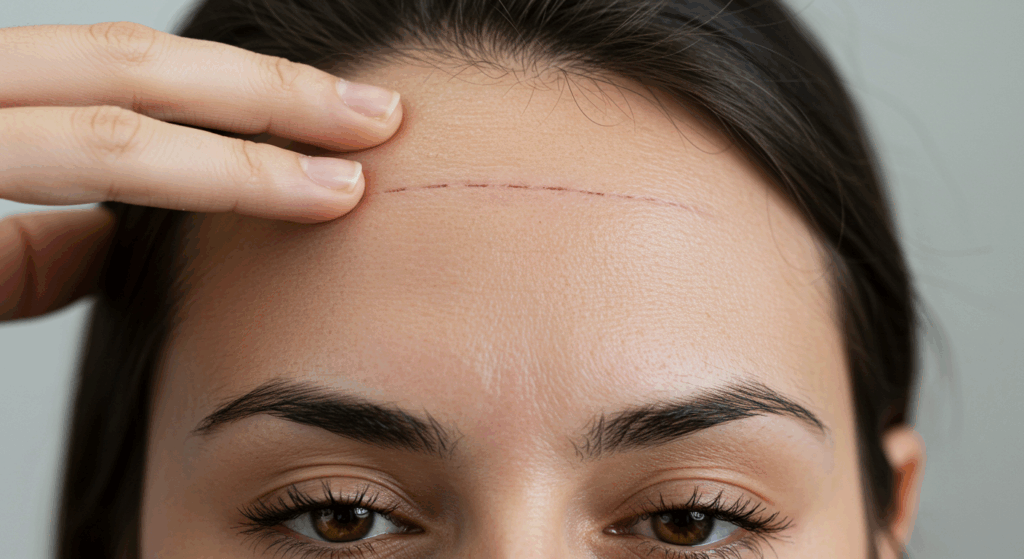Sottoposto a coronal incisione procedura is a significant step, whether for medical or cosmetic reasons. Proper pre-operative preparazione is crucial for ensuring a smooth chirurgia and optimal recupero. Questo guida provides a comprehensive, step-by-step breakdown of everything you need to know before your procedure, from medical evaluations to lifestyle adjustments.
By following these guidelines, you’ll minimize rischi, enhance recovery, and achieve the best possible outcome. Let’s dive into the essential preparations you need to make.

Sommario
1. Valutazioni e consulenze mediche
1.1. Valutazione medica pre-chirurgica
Before your procedura di incisione coronale, your surgeon will conduct a thorough medical assessment to ensure you’re a suitable candidate. This typically includes:
- Analisi del sangue: Per verificare la presenza di infezioni, anemia o disturbi della coagulazione.
- Elettrocardiogramma (ECG): Per valutare la salute del cuore, in particolare nei pazienti di età superiore ai 40 anni o con una storia di malattie cardiache.
- Chest X-Ray: Per valutare la salute dei polmoni ed escludere problemi respiratori.
- Test allergologici: To identify potential allergic reactions to anestesia or medications.
1.2. Consultazione con il chirurgo
Durante la visita, il chirurgo:
- Parlate della vostra storia clinica, compresi interventi chirurgici passati, patologie croniche e farmaci assunti.
- Spiega la procedura in dettaglio, inclusi rischi, benefici e risultati attesi.
- Fornire istruzioni preoperatorie personalizzate in base alle vostre esigenze specifiche.
For more insights on preparing for chirurgia, consulta la nostra guida su come prepararsi alla chirurgia plastica.
2. Modifiche dello stile di vita prima dell'intervento chirurgico
2.1 Dieta e nutrizione
Your diet plays a critical role in preparing your corpo for surgery. Focus on:
- Idratazione: Bevi almeno 8 bicchieri d'acqua al giorno per rimanere idratato.
- Dieta equilibrata: Consume a diet rich in proteins, vitamins, and minerals to support guarigione. Include lean meats, fruits, vegetables, and whole grains.
- Evitare alcol e caffeina: Entrambi possono disidratarti e interferire con l'anestesia.
2.2. Fumo e nicotina
Smoking and nicotine use can impair healing and increase the risk of complicazioni. It’s essential to:
- Smettere di fumare almeno 4 settimane prima dell'intervento.
- Evita cerotti alla nicotina, gomme da masticare o prodotti per lo svapo.
2.3. Esercizio e attività fisica
Sebbene sia importante mantenersi attivi, è consigliabile evitare attività fisica intensa nella settimana precedente l'intervento. Concentrarsi su attività leggere, come camminare, per favorire la circolazione.
3. Gestione dei farmaci
3.1. Farmaci da evitare
Alcuni farmaci possono aumentare il sanguinamento o interferire con l'anestesia. Il chirurgo potrebbe consigliare di evitare:
| Tipo di farmaco | Esempi | Quando fermarsi |
|---|---|---|
| anticoagulanti | Aspirina, Warfarin, Ibuprofene | 2 settimane prima dell'intervento chirurgico |
| Integratori a base di erbe | Ginkgo Biloba, Aglio, Ginseng | 2 settimane prima dell'intervento chirurgico |
| Vitamina E | Integratori ad alto dosaggio | 2 settimane prima dell'intervento chirurgico |
3.2. Farmaci approvati
Your surgeon may prescribe or approve certain medications to manage Dolore or prevent infections post-surgery. Always follow their instructions regarding:
- Antibiotici per prevenire le infezioni.
- Antidolorifici per il comfort postoperatorio.
4. Logistica e pianificazione
4.1. Organizzare il trasporto
You won’t be able to drive immediately after surgery. Arrange for a friend or family member to drive you casa post-procedure.
4.2. Prepara il tuo spazio di recupero
Crea una confortevole area di recupero in casa con:
- Cuscini per tenere la testa sollevata.
- Ice packs to reduce rigonfiamento.
- Pasti e spuntini facili da preparare.
- Intrattenimento come libri, film o musica.
4.3. Pianificare le cure post-operatorie
Assicuratevi di avere qualcuno che vi assista per le prime 24-48 ore dopo l'intervento. Può aiutarvi con:
- Somministrazione di farmaci.
- Preparazione dei pasti.
- Assistenza alla mobilità.
Per ulteriori suggerimenti sul recupero, leggi il nostro articolo su consigli per una ripresa senza intoppi dopo l'intervento chirurgico.
5. Preparazione mentale ed emotiva
Sottoporsi a un intervento chirurgico può essere emotivamente impegnativo. Ecco come prepararsi mentalmente:
- Istruisciti: Scopri di più sulla procedura, sul processo di recupero e sui risultati attesi per ridurre l'ansia.
- Stabilisci aspettative realistiche: Understand that recovery takes time and risultati may not be immediate.
- Practice Relaxation Techniques: La meditazione, la respirazione profonda o lo yoga possono aiutare a gestire lo stress.
6. Comprensione dei rischi e delle complicazioni
Ogni intervento chirurgico comporta dei rischi. Per una procedura di incisione coronale, le potenziali complicazioni includono:
- Infezione nel sito dell'incisione.
- Sanguinamento o ematoma.
- Danni ai nervi che causano intorpidimento o debolezza.
- Scarring or capelli loss along the incision line.
Per saperne di più sui rischi, visita il nostro articolo su Lifting endoscopico vs lifting coronale delle sopracciglia: pro e contro.
7. Lista di controllo pre-operatoria
Utilizza questa checklist per assicurarti di essere completamente preparato per la procedura di incisione coronale:
| Compito | Completato |
|---|---|
| Completare tutti gli esami medici preoperatori | |
| Consulta il tuo chirurgo e rispondi a tutte le domande | |
| Regolare la dieta ed evitare alcol, caffeina e fumo | |
| Smettere di assumere anticoagulanti e integratori a base di erbe | |
| Organizzare il trasporto e l'assistenza postoperatoria | |
| Prepara il tuo spazio di recupero a casa | |
| Praticare tecniche di rilassamento per gestire lo stress |

Conclusione: il tuo percorso verso una procedura di successo
Punti di forza
- Una corretta preparazione preoperatoria è essenziale per ridurre al minimo i rischi e garantire una convalescenza senza intoppi.
- Seguire le istruzioni del chirurgo per quanto riguarda le valutazioni mediche, gli adattamenti dello stile di vita e la gestione dei farmaci.
- Pianificare in anticipo le cure postoperatorie e preparare l'ambiente di recupero.
- Comprendere i potenziali rischi e le complicazioni associati alla procedura di incisione coronale.
Prossimi passi
Ora che hai a disposizione questa guida completa, procedi come segue:
- Pianifica le tue valutazioni mediche preoperatorie.
- Per qualsiasi ulteriore domanda, consulta il tuo chirurgo.
- Inizia ad apportare modifiche al tuo stile di vita per preparare il tuo corpo all'intervento chirurgico.
- Organizzare la logistica, come il trasporto e l'assistenza post-operatoria.
Domande frequenti (FAQ)
1. Quanto tempo ci vuole per riprendersi da una procedura di incisione coronale?
I tempi di recupero variano, ma la maggior parte dei pazienti può tornare alle normali attività entro 2-4 settimane. Il recupero completo può richiedere diversi mesi.
2. Dopo la procedura rimarranno delle cicatrici visibili?
The coronal incision is typically made along the attaccatura dei capelli, which helps conceal scars. However, some scarring may be visible initially but usually fades over time.
3. Posso lavarmi i capelli dopo l'intervento?
Dovrai evitare di lavarti i capelli per almeno 48 ore dopo l'intervento. Il tuo chirurgo ti fornirà istruzioni specifiche su quando sarà sicuro riprendere a lavarli.
4. Cosa dovrei indossare il giorno dell'intervento?
Indossare abiti comodi e larghi, che non debbano essere tirati dalla testa. Evitare gioielli, trucco o lenti a contatto.
5. Come posso gestire il dolore dopo la procedura?
Il chirurgo prescriverà antidolorifici per gestire il fastidio. Anche l'applicazione di impacchi di ghiaccio sulla zona dell'incisione può aiutare a ridurre gonfiore e dolore.
6. Ci sono restrizioni dietetiche dopo l'intervento chirurgico?
Per i primi giorni, preferire cibi morbidi e facili da digerire. Evitare cibi piccanti, croccanti o difficili da masticare che potrebbero affaticare la zona dell'incisione.
7. Quando posso tornare al lavoro?
La maggior parte dei pazienti può tornare al lavoro entro 2-3 settimane, a seconda della natura dell'attività svolta. Evitare attività faticose per almeno 4-6 settimane.
8. Quali sono i segni di infezione dopo l'intervento chirurgico?
Prestare attenzione a sintomi come aumento del dolore, arrossamento, gonfiore o secrezione dal sito dell'incisione. Anche febbre o brividi possono indicare un'infezione. Contattare immediatamente il chirurgo se si nota uno qualsiasi di questi segni.
Visita Profilo Instagram del Dr.MFO per vedere le reali trasformazioni dei pazienti! Dai un'occhiata agli incredibili risultati ottenuti con il trattamento viso chirurgia di femminilizzazione e altro procedure. The profile showcases before-and-after foto che evidenzia Dott. MFOL'esperienza e la visione artistica di nel creare risultati belli e dall'aspetto naturale.
Pronto a fare il passo successivo nel tuo viaggio? Pianificare un consulenza gratuita con Dott. MFO ( Miglior chirurgo per la femminilizzazione del viso per te) oggi. Durante la consulenza, puoi discutere i tuoi obiettivi, fare qualsiasi domanda tu possa avere e saperne di più su come Dott. MFO può aiutarti a ottenere il look desiderato. Non esitare a sfruttare questa opportunità gratuita per esplorare le tue opzioni e vedere se Dott. MFO è la soluzione giusta per te.








